

Is Jordan Immune to the Arab Spring Uprisings? - events2013 - Events - Middle East Centre. Speaker: Dr Tariq Tell Chair: Professor Fawaz Gerges, LSE Wednesday 23 January 2013, 18.30 - 20.00, CLM 7.02, Clement House, LSE Follow on Twitter: #LSEjordan Dr Tell will provide context to contemporary politics in Jordan by examining the history of the emergence and consolidation of the modern state in Jordan under Ottoman, British, and Hashemite rule.
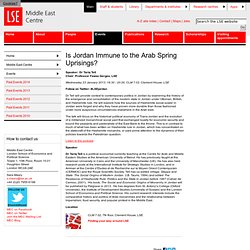
He will explore how the sources of Hashemite social power in Jordan were forged and why they have proven more durable than those fashioned under more auspicious circumstances elsewhere in the Arab east.
A Rejoinder to the Response of Lama Abu Odeh: On Jordan, the Hashemite Regime, and the Current Mobilizations. [This article was written as a rejoinder to Lama Abu Odeh's response to the author's interview on the history of state formation in Jordan and regime-society relations in the context of the Arab uprisings.
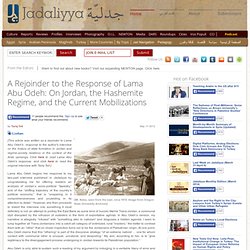
Click here to read Lama Abu Odeh's response, and click here to read the original interview with Tariq Tell.] Lama Abu Odeh begins her response to my two-part interview published in Jadaliyya by congratulating me for offering readers an analysis of Jordan’s socio-political “tapestry,” and of the “shifting trajectory of the country’s political economy,” that is “unsparing in it comprehensiveness and unyielding in its attention to detail.”
However, she then proceeds to distort the interview into something it most definitely is not: an attempt to portray the East Bank as some kind of bucolic Merrie Trans-Jordan, a communal idyll disrupted by the intrusion of outsiders in the form of exploitative aghrab. Furthermore, in Abu Odeh’s version of historical change, cities seem to count most.
Jordan - smoke, mirrors and election laws. ‘Confusing?
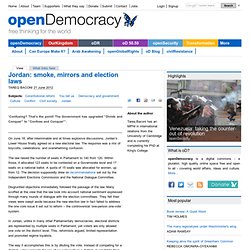
That’s the point! The Government has upgraded “Divide and Conquer” to “Confuse and Conquer”’. On June 18, after interminable and at times explosive discussions, Jordan’s Lower House finally agreed on a new electoral law. The response was a mix of boycotts, celebrations, and overwhelming confusion. Dallying with Reform in a Divided Jordan. [The following is the latest from the International Crisis Group (ICG) on Jordan.]
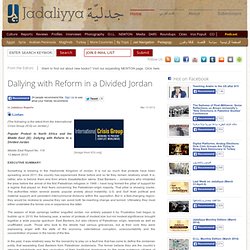
Popular Protest in North Africa and the Middle East (IX): Dallying with Reform in a Divided Jordan Middle East Report No. 11812 March 2012 Something is brewing in the Hashemite Kingdom of Jordan. It is not so much that protests have been spreading since 2011; the country has experienced these before and so far they remain relatively small. It is, rather, who is behind them and from where dissatisfaction stems.
The season of Arab uprisings neither engulfed Jordan nor entirely passed it by. In the past, it was relatively easy for the monarchy to play on a fault line that has come to define the Jordanian polity, that separating East Bankers from Palestinian Jordanians. External Rents, Durable Authoritarianism, and Institutional Adaptation in the Hashemite Kingdom of Jordan. Political risks to watch in Jordan. AMMAN: Jordan's King Abdullah faces growing challenges ranging from protests fuelled by economic hardship and demands for reform to resistance within his tribal power base over political liberalisation that could weaken its influence.

Jordan's defining faultline between its "East Bank" and Palestinian citizens also poses a long-term threat. Having seen the uprisings sweeping the Arab world, Abdullah has tried to implement long-promised political reform, despite opposition from a security apparatus and bloated bureaucracy whose salaries eat up most of the $9 billion budget. The most far-reaching has been a package of constitutional amendments proposed last August to empower parliament and pave the way for the prime minister to emerge from a parliamentary majority instead of being picked by the king.
Palestinians dominate business but are sharply under-represented in politics. The extra spending has pushed up the projected 2011 budget deficit to a forecast 6.2 percent of GDP.
Jordan - curators... Jordan's Balancing Act. When anti-monarchical revolution swept the Middle East in the 1950s, Jordan was one of the few populous Arab states to keep its king.
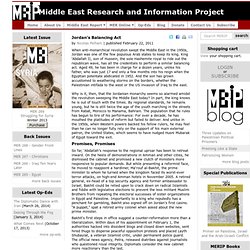
King ‘Abdallah II, son of Hussein, the sole Hashemite royal to ride out the republican wave, has all the credentials to perform a similar balancing act. Aged 49, he has been in charge for a dozen years, unlike his father, who was just 17 and only a few months into his reign when the Egyptian potentate abdicated in 1952. The Flaws of Jordan’s Largest Terrorism Trial. Jordan: a profit and loss statement. Jordan can neither join a list of winners benefiting from the "Arab spring" nor join a list of losers.
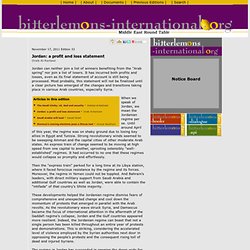
It has incurred both profits and losses, even as its final statement of account is still being processed. Most probably, this statement will not be finalized until a clear picture has emerged of the changes and transitions taking place in various Arab countries, especially Syria. When we speak of Jordan, we mean the Jordanian regime per se. Until around April of this year, the regime was on shaky ground due to losing key allies in Egypt and Tunisia. Strong revolutionary winds seemed to be sweeping Amman and the capital cities of other moderate Arab states.